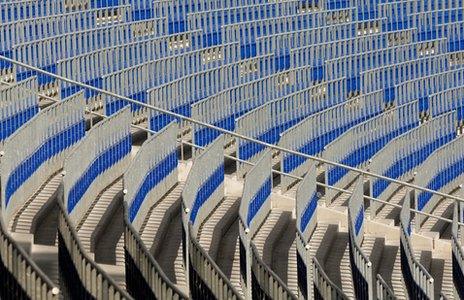Scottish Premier League gives green light for standing areas
- Published

Rail seating, like this at Hannover, could be introduced. Photo: Stadionwel鈥媡.de
Scottish Premier League clubs have been given the green light to have safe-standing areas within their stadiums.
The SPL announced a relaxation of its rules on standing following a general meeting of all 12 clubs on Monday.
The league's chief executive Neil Doncaster said the move came in response to supporter demand.
"Whenever we talk to supporters about what they'd like to see, safe standing comes up as one of the things they'd like to see," he told 91热爆 Scotland.
"Whilst there's a number of hurdles that clubs would need to overcome to re-introduce standing at their grounds, our rules are one of those hurdles.
"So, that's now out the way and that paves for clubs to come forward with pilot schemes if they have the support of their local police force and local safety committee to come forward and put forward pilot schemes that the SPL board can look at."
A Strathclyde Police spokeswoman expressed surprise at the announcement, saying: "We have not had any detailed discussions with the SPL around the safe-standing areas.
"If the SPL would like to discuss the issue with us then perhaps we would be able to understand what the specific proposals are."
Terraces were banned following the Hillsborough disaster in 1989 and the issue of allowing some standing areas has been revisited since all-seater stadiums became compulsory in England in 1994.
Scotland is not bound by the law which banned standing areas in top-flight football in England, which came into force after the Taylor Report into the Hillsborough disaster.
"That legislation was introduced in England back in the 80s," said Doncaster "In Scotland, I think there was a view that Scottish football was already well underway with making improvements at that time.
"The perception from some that we're going to see the re-introduction of open terraces as was the case before is wide of the mark. What we'll be looking at and what we'll be welcoming are pilot schemes put forward that look at the rail seating systems that we see, for example, in Germany.
"Having spent some time recently in Germany, looking at the systems at Borussia Dortmund, it's a fantastic system and it certainly does a great deal for the atmosphere within the ground and if it is introduced here, if we are able to get pilots away, hopefully we'll see the same here.
"The systems are fairly straight forward to police. There are some stadia where it simply wouldn't work but there are some stadia where it could work.
"Friday night football, safe standing areas; all of these are issues that are responding to supporter demand, looking at ways in-which we can improve the product and tempt people back through the turnstyles."
SPL rules currently state that clubs must only use seated areas with a minimum of 6,000 seats per stadium.
"The fans are standing anyway," Aberdeen manager Craig Brown told 91热爆 5Live. "So I think it's better to make it official and to have the police involved.
"I'm a traditionalist and I certainly enjoyed standing at a match.
"The fans are a bit more involved when they are standing and can get more excited.
"I'm not so sure it will make a big difference on attendances but I would imagine it would be less expensive to stand rather than sit."
Celtic, Rangers, Kilmarnock and Motherwell are known to be keen on exploring the possibility of introducing standing areas and St Johnstone would not rule it out but St Mirren have no plans to modify their recently constructed stadium.
The English Premier League has indicated opposition to moves to reintroduce standing areas at top-flight football matches, while the .
Meanwhile, the SPL has also tightened the rules governing unacceptable conduct, to include: "using words, conduct or displaying any writing or other thing which indicates support for, or affiliation to, or celebration of, or opposition to an organisation proscribed in terms of the Terrorism Act 2000."
Doncaster said: "Changes to our rules on unacceptable conduct raise the bar in terms of what is expected of clubs and shows our clubs are committed to playing their part in tackling unacceptable conduct."
- Published23 March 2011